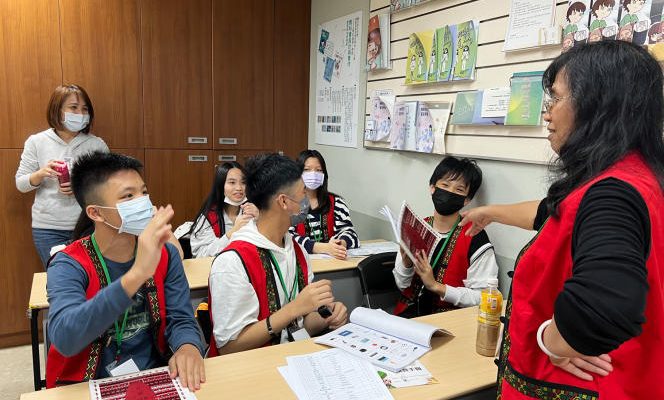“How do you say a cobra? “Kakohkoh!” exclaim the students in chorus. They only have a few minutes left to revise before the Aboriginal language competition. In class of 3e in Taipei, six girls and boys meet in a university in the capital of Taiwan to challenge seven other teams, this Saturday, March 18. All are dressed in the same traditional outfit, a red vest embroidered with geometric patterns. The teenagers immerse themselves in their notebooks, under the strict gaze of their teacher, Nikar Namoh.
Dark skin and long wavy black hair, this 60-year-old woman has already devoted a third of her life to teaching the idiom of her ancestors, the friends, mainly spoken in the east of the island. His vocation resonates as a revenge against his past. “I moved to Taipei when I was 8 years old because my parents could easily find work there, she says. At the time, I was not allowed to speak the friend, under pain of a fine. I was ashamed of being native. Society considered us inferior. Later, I decided to teach to give back to my people the love they deserve. »
Long banished and now in decline, Taiwan’s native dialects are experiencing a belated resurgence. Over the past four years, enrollment in their language certification tests has jumped 75%. Through the promotion of the 16 officially recognized languages, the island is trying to assert a national identity and to stand out internationally, in an increasingly tense context with China.
Japanese then Chinese domination
First inhabitants, settled for about five thousand years, the natives represent 2.5% of the Taiwanese population. When the country was colonized by Japan, between 1895 and 1945, the authorities imposed Japanese on them. At the end of World War II, the Kuomintang, the Chinese Nationalist Party, took control of Taiwan. The army established a dictatorship called “white terror” in 1947. Two years later, the arrival of the government of Chiang Kai-shek on the island provoked a massive migration of Han Chinese. The original inhabitants are then forced to express themselves in Mandarin Chinese and suffer discrimination. A painful memory for Nikar Namoh: “I will never forget the day when, as a schoolgirl, as I was walking down the road, a Han child hit my back. I didn’t fight back, because the people around me were all Han Chinese. »
Huang Shu-zhen, a native, came to accompany her children to the competition. As in many families, his parents did not transmit the language to him because of the repressive context. She only speaks Mandarin, but her son, Yi-fu, 13, has decided to take up the torch by enrolling in classes at his college. “I want to be able to communicate with the people of the tribe, he whispers. If my language disappears, we cannot go back and the culture of my ethnic group will disappear. »
You have 49.22% of this article left to read. The following is for subscribers only.
